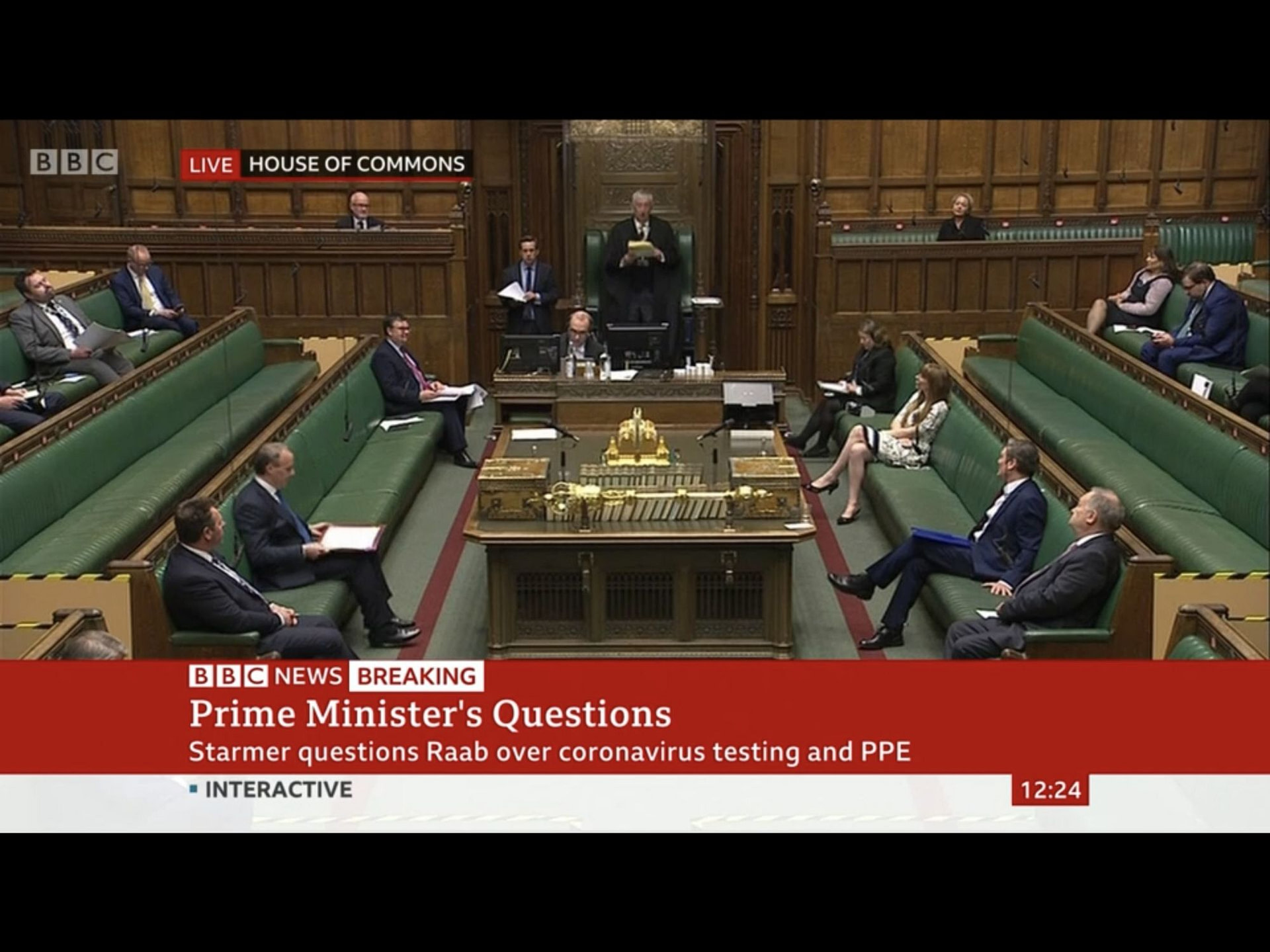
The Lord Mayor Of London is one of the oldest civil elected offices in the world, an elected figure taking that role continuously since 1189. Elections were held during the Black Death, the Great Fire, the Civil War and both World Ward. This week it was revealed that for the first time the election would not be held and the incumbent Lord Mayor of London would continue his role for at least another year. The only comparable time was when Dick Wittington died in office and was replaced by a temporary Lord Mayor until an election could be held. This is by way of an illustration of the continuance of Great British government, rule of law and tradition. And so it is with the Houses of Parliament, full of tradition and practices that date back centuries, far beyond any actual need. Introducing microphones and television cameras into the Houses of Parliament is still a relatively modern trend.
This is a place where every MP has a named peg to they hang their coats with a purple ribbon attached for their swords. While green ribbons must be used when taking bills to the House Of Lords. The Speaker of the Commons, an appointed MP, has to be literally dragged from his seat by officials to take office. Wheras an MP has to be officially kidnapped and he's in Buckingham Palace when the Queen makes a speech in the House or Lords – she is forbidden from entering the House Of Commons. Instead, the Mace is a symbol of the Queen's authority that sits in the House of Commons chamber when Parliament is in session. Any debate that takes place without it being there is illegal. MPs have grabbed it to make a point. The official known as Black Rod who serves in the Lords must have the door of the House Of Commons slammed in his face three times when he knocks to call MPs to hear the Queen. Over the centuries the knocking (with a big black rod) has seriously damaged the door, but no one will have it repaired. Also no mention of the House Of Lords is been mentioned in Parliament, occasionally referred to as 'the other place'. And only in the last five years has Parliament stopped printing copies of bills and acts on treated goatskin or calfskin, called vellum, in favour or archival paper. Though the front and pack covers still have to be on vellum. This change only took 60 years to implement. But the coronavirus has overturned centuries of tradition. Similar moves previous to this were stopped instantly. These are strange times, and the look of today's Prime Minister's Questions were a testament to this.
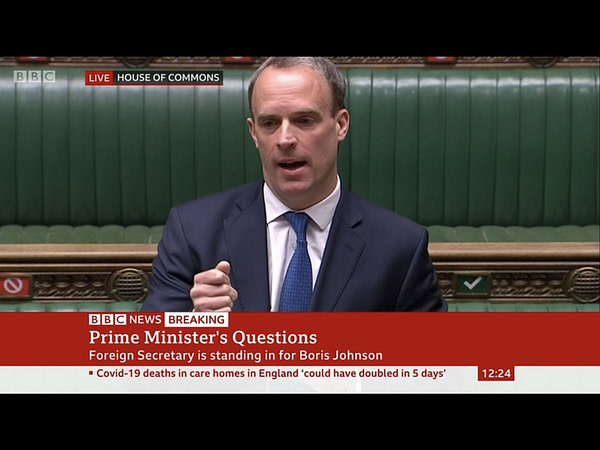
Prime Minister's Question Time was led by first Secretary Dominic Raab MP, as the Prime Minister Boris Johnson is still recovering from a serious bout of COVID-19. It was also the first outing for the newly elected Leader of The Opposition Kier Starmer MP. To an almost empty house, questions were delivered virtually on screens in the house, piped in directly to those of us watching on televisions. Gone were the crowded benches, gone were the Hear Hears, the boos, the raucous, the laughter. While that environment has always been a boon to Boris, the lack of this seemed to make Dominic Raab seem a weaker figure, while Starmer relished the quiet, able to make a better case for government incompetence at this time, without being shouted down.
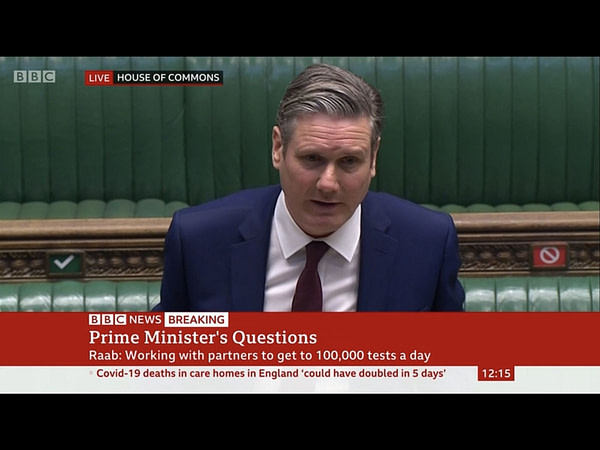
But it was the questions coming in on television that were the strangest change, resembling a television news programme, or bizarre chat show, with fifty MPs being pre-selected by the Speaker Of The House, rather than the usual tactic of placing prayers on the House Of Commons benches early, to get a good seat from which one can catch the Speaker's eye. Yes, that's right, prayers placed into prayer slots on the benches is the usual way to get your question to the House ahead of the others, and the last time I visited Parliament, I had Ed Davey, Liberal Democrat MP barge past me in the rudest manner to fill his own slot. He was also picked to ask questions, about my local hospital in Kingston-Upon-Thames, also local to Davey and Raab, and a longstanding doctor who worked there and had died of COVID-19.
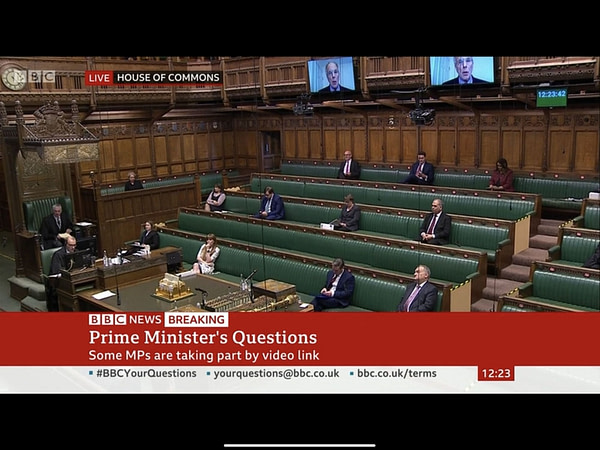
The idea of MPs being able to ask questions directly of the Prime Minister, is at the very heart of British democracy. every week, the Prime Minister has to subject themselves to what can be a humiliating experience, but can also be the making of them. It also tells the entire country that the Prime Minister must be accountable for the actions for their government. But one of the constitutional principles is that the members must be present in the House to ask their questions, directly. That hasn't changed in the centuries in which it was established. Now it took less than a month. However bizarre this all looks it is worth remembering the very serious nature of events that have led to these changes. Also that the previous state of affairs in Parliament was never less bizarre.
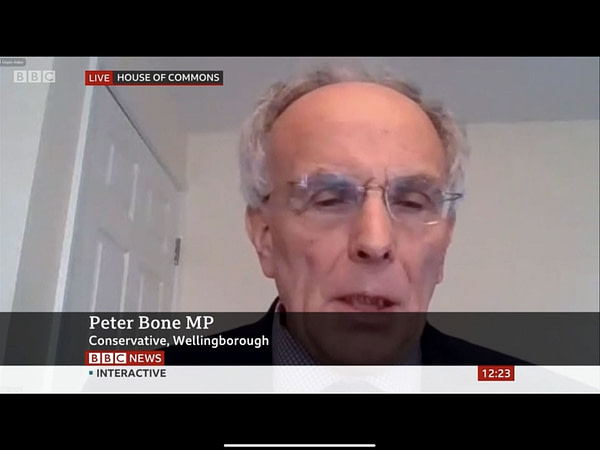
Here are the selected questioners for today's session.
- Alex Stafford (Con)
- David Mundell (Con)
- Peter Bone (Con)
- Lucy Powell (Lab)
- Sally-Ann Hart (Con)
- Barry Gardiner (Lab)
- Nick Fletcher (Con)
- Naz Shah (Lab)
- Matt Vickers (Con)
- Stephen Kinnock (Lab)
- James Sunderland (Con)
- Ruth Cadbury (Con)
- Nicola Richards (Con)
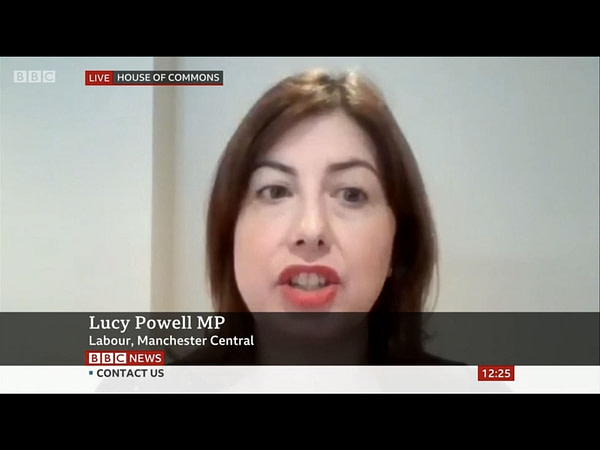
- Ed Davey (LD)Fray Jones (Con)
- Liz Saville Roberts (PC)
- Luke Evans (Con)
- Angela Eagle (Lab)
- Cheryl Gillan (Con)
- Fleur Anderson (Con)
- Jonathan Gullis (Con)
- Liz Twist (Lab)
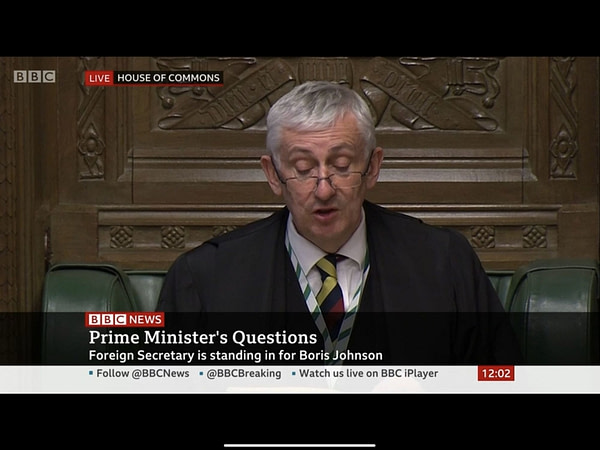
- Jerome Mayhew (Con)
- Jessica Morden (Lab)
- Lucy Allan (Con)
- Jonathan Edwards (PC)
- Simon Baynes (Con)
- Tonia Antoniazzi (Lab)
- Virginia Crosbie (Con)
- Chris Elmore (Lab)
- Gagan Mohindra (Con)
- Stephen Doughty (Lab)
- Sheryl Murray (Con)
- Judith Cummins (Lab)
- Caroline Ansell (Con)
- Lloyd Russel-Moyle (Lab)
- Ranil Jayawardena (Con)
- Barbara Keeley (Lab)
- Giles Watling (Con)
- Wes Streeting (Lab)
- Mark Fletcher (Con)
- Liam Byrne (Lab)
The post Today, Prime Minister's Question Time Went Semi-Virtual appeared first on Bleeding Cool News And Rumors.


No comments:
Post a Comment